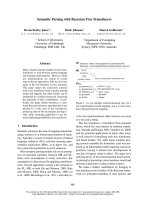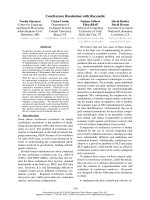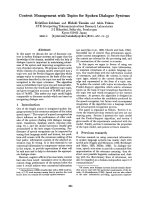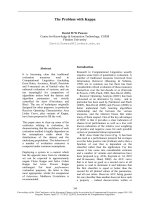báo cáo khoa học: "Pancytopenia associated with clonazepam" pps
Bạn đang xem bản rút gọn của tài liệu. Xem và tải ngay bản đầy đủ của tài liệu tại đây (410.32 KB, 2 trang )
CAS E REP O R T Open Access
Pancytopenia associated with clonazepam
Marnelli A Bautista-Quach
1
, Yu-Min Liao
2
, Chung-Tsen Hsueh
3*
Abstract
We report a case of a 48-year-old Chinese female with end-stage renal disease and chronic anemia on hemodialy-
sis. Clonazepam was prescribed for myoclonus disorder two weeks prior to her hospitalization. Subsequently, she
was hospitalized for neutropenic fever with thrombocytopenia and worsening anemia. Bone marrow examination
demonstrated a markedly hypocellular marrow (10-20% total cellularity). Clonazepam was discontinued, with gra-
dual improvement of thrombocytopenia, and neutropenia in 1-2 weeks. To our knowledge, this is the first reported
case of pancytopenia associated with clonazepam. We recommend patients taking clonazepam to be monitored
with regular complete blood count to check for clinically significant pancytop enia or thrombocytopenia.
Introduction
Clonazepam, a benzodiazepine derivative is used for the
treatment of epilepsy, psychiatric, and neurologic disor-
ders [1]. Clonazepam has also been utilized in alleviating
movement disorders and restless leg syndrome in
patients with end-stage renal disease [2,3]. Cases of
thrombocytopenia from clonazepam and other benzo-
diazepines have been described [4-6]. We report an
event of pancytopenia associated with clonazepam in a
patient with end-stage renal disease.
Case Report
A 48-year-old Chinese female with end-stage renal
disease on hemodialysis, and mild chronic anemia
presented with fever, chills and new-onset leukopenia
and thrombocytopenia. She was started on clonazepam
(0.25 mg orally twice a day) for myoclonus approxi-
mately two weeks prior. Her other medicines included
erythropoie tin, felodipine, aluminum hydroxide, calcium
carbonate, labetalol, folic acid, and daily vitamin B com-
plex. She received two units of packed red blood cells
for worsening anemia, with a hemoglobin value of 6 g/dL.
Post-transfusion complete blood count (CBC) revealed a
hemoglobin of 7.6 g/dL (MCV 92 fL), white blood
cell (WBC) count of 460/μL (absolute neutrophil count of
69/μL), and platelet count of 89,640/μL. She subsequently
developed fever and chills and was admitted to the
hospital the following day.
On the day of admission, CBC showed a WBC count
of 386/μL (absolute neutrophil count of 49/μL), hemo-
globin of 8.17 g/dL (MCV 91.2 fL), and platelet count of
62,300/μL. Blood culture was obtained which exhibited
no growt h of microorganisms. She was em pirically trea-
ted with broad-spectrum antibiotics. Evaluation for
human immunodeficiency virus, hepatitis B and hepatitis
C viruses were negative. Antinuclear antibody study was
non-reactive. Both folate and vitamin B12 levels were
within normal ranges. Peripheral blood smear revealed
pancytopenia without leukemic blasts. A bone marrow
biopsy p redominately consisted of adipose tissue, with
significantly decreased myeloid and erythroid precursors,
as well as megakaryocytes, reflecting a 10-20% overall
cellularity (Figs. 1 and 2). No aggregates of blasts or
atypical cells were identified. Review of medications sug-
gested that clonazepam, which was added to the
patient’s regimen two weeks prior to admission, most
likely precipitated pancytopenia. Clonazepam was conse-
quently discontinued. Her other medications were main-
tained. The thrombocytopenia resolved in four days, and
neutropenia gradually improved within 1-2 weeks. She
was discharged about a week from the day of admission,
with CBC showing WBC count of 1,460/μL, hemoglobin
of 7.56 g/dL, and platelet count of 246,000/μL.
Discussion
Several hypotheses have been illustrated in drug-induced
aplastic anemia including dire ct toxic effect to he mato-
poietic elements, and immune-mediated destruction sec-
ondary to idiosyncratic reaction to a drug [7]. El-Sayed
and Symonds reported a case of mild pancytopenia in a
* Correspondence:
3
Division of Medical Oncology and Hematology, Loma Linda University
Medical Center, Loma Linda, CA 92354, USA
Bautista-Quach et al. Journal of Hematology & Oncology 2010, 3:24
/>JOURNAL OF HEMATOLOGY
& ONCOLOGY
© 2010 Bautista-Quach et al; licensee BioMed Central Ltd. This is an Open Access article distributed under the terms of the Creative
Commons Attribution License ( which permits unrestricted use, distribution, and
reproduction in any medium, provided the original work is properly cited.
patient receiving lorazepam and pelvic radiotherapy with
a nadir WBC of 2,300/μL, hemoglobin of 11 .2 g/dL, and
platelet of 90,000/μL [8]. However, bone marrow evalua-
tion was not performed to exclude primary or radiation-
related hematologic conditions. Hence, direct effect
from radiotherapy could not be completely excluded.
Additional ly, benzodiazepine-induced thrombocytopenia
has been shown to be mediated by platelet-specific anti-
bodies [6].
To our knowledge, our case represents the first
reported occurrence of pancytopenia associated with
clonazepam. Patients taking clonazepam must be moni-
tored with regular CBC analyses to check for likely
development of clinically significant pancytopenia or
thrombocytopenia. If indicated, serology may also be
pursued to determine the prese nce of benzodiazepin e-
dependent antibodies against platelet. Cessation of the
drug usually results in gradual improvement of blood
counts. Patients should not be re-challenged once hema-
tologic dyscrasia has been documented.
Consent
Written informed consent was obtained from the patient for publication of
this case report and accompanying images. A copy of the written consent is
available for review by the Editor-in-Chief of this journal.
Competing interests
The authors declare that they have no competing interests.
Authors’ contributions
MBQ, YML and CTH performed literature review, and participated in the
composition of this case report. YML and CH obtained patient’s consent,
pertinent clinical data, and photomicrographs. All authors read and
approved the final manuscript.
Author details
1
Department of Pathology and Laboratory Medicine, Loma Linda University
Medical Center, Loma Linda, CA 92354, USA.
2
Department of Internal
Medicine, China Medical University Hospital, Taichung, Taiwan, China.
3
Division of Medical Oncology and Hematology, Loma Linda University
Medical Center, Loma Linda, CA 92354, USA.
Received: 28 May 2010 Accepted: 14 July 2010 Published: 14 July 2010
References
1. Morishita S: Clonazepam as a therapeutic adjunct to improve the
management of depression: a brief review. Hum Psychopharmacol 2009,
24(3):191-198.
2. Mandel S, Au S, Rudnick M: Clonazepam in Dialysis Encephalopathy. JAMA
1982, 247(13):1810-b-1811.
3. Brouns R, De Deyn PP: Neurological complications in renal failure: a
review. Clin Neurol Neurosurg 2004, 107(1):1-16.
4. Veall RM, Hogarth HC: Letter: Thrombocytopenia during treatment with
clonazepam. Br Med J 1975, 4(5994):462.
5. Livingston S, Pauli LL: Benzodiazepine anticonvulsant. Arch Neurol 1976,
33(10):731.
6. Conti L, Gandolfo GM: Benzodiazepine-induced thrombocytopenia.
Demonstration of drug-dependent platelet antibodies in two cases. Acta
Haematol 1983, 70(6):386-388.
7. Young NS: Acquired aplastic anemia. Ann Intern Med 2002, 136(7):534-546.
8. El-Sayed S, Symonds RP: Lorazepam induced pancytopenia. Br Med J (Clin
Res Ed) 1988, 296(6632):1332.
doi:10.1186/1756-8722-3-24
Cite this article as: Bautista-Quach et al.: Pancytopenia associated with
clonazepam. Journal of Hemato logy & Oncology 2010 3:24.
Submit your next manuscript to BioMed Central
and take full advantage of:
• Convenient online submission
• Thorough peer review
• No space constraints or color figure charges
• Immediate publication on acceptance
• Inclusion in PubMed, CAS, Scopus and Google Scholar
• Research which is freely available for redistribution
Submit your manuscript at
www.biomedcentral.com/submit
Figure 1 Bone marrow biopsy (hematoxylin and eosin, 200×).
Trephine core biopsy showed predominant adipose tissue with
significantly decreased hematopoietic elements (10-20% total
marrow cellularity).
Figure 2 Bone marrow biopsy (hematoxylin and eosin, 400×).
Trephine core biopsy showed occasional scattered erythroid and
myeloid precursors, and a megakaryocyte.
Bautista-Quach et al. Journal of Hematology & Oncology 2010, 3:24
/>Page 2 of 2









